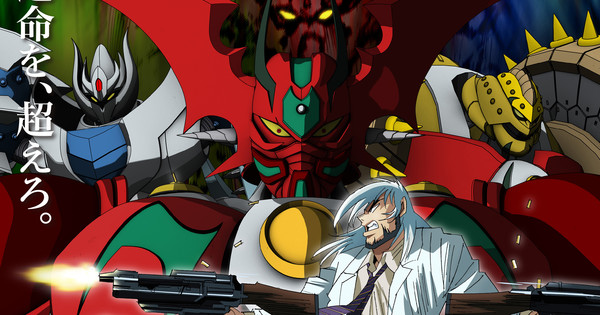ayase
State Alchemist
That thread was an interesting read @Neil.T and I think my overall thoughts on the series probably skew closer to those of @Professor Irony although with some important caveats - I personally really enjoyed when the show shifted away from the action to focus on the characters after Episode 6, it was just a shame that much of that ultimately had little bearing on where those characters' stories went.
The Eva and Lagann comparisons are apt because for me, that's somewhere Franxx falls down hard. Those shows had overriding themes they placed all their chips on - In Eva's case depression, and in Lagann's self-actualisation. I would have enjoyed it a great deal if Franxx had done the same for love and sex but, perhaps ironically, it wasn't willing to commit.
When Eva (and even Lagann) takes us aside and examines who the characters are and why, we understand those characters better. It helps explain their behaviour in the past and has some bearing on their direction going forward. Zero Two was the closest we came to this kind of development, because by Episode 12 we have a pretty good understanding of what made her the way she is. Perhaps if at this point she had questioned what she wanted or what she did to get there, they might have had somewhere to take her character. But instead her growth just seems to end. Her past, once exposed, appears to become entirely irrelevant to her present or future, despite the fact it has shaped her character utterly up until this point.
And then there are characters who didn't even make it that far. We understood Zorome's character as brash and competitive but unquestioningly loyal. When we get his little side-story we find that deep down, he is desirous of other kinds of familial relationships, the kind he can't find among his fellow parasites. We discover that what he really wants is a parental figure and that for him the distant approval of Papa, the medal being unemotionally pinned to his chest, is the only thing filling the void of parental acknowledgement, encouragement and love. That was all great. But after that happened, after he got a taste of what a mother/son relationship could potentially be like, how did that effect him going forward in the story? Forgive me if I'm wrong, but I don't think it really did.
With the Futoshi/Kokoro/Mitsuru storyline there was an opportunity there to explore that feeling of unrequited love from both sides; Seeing Futoshi's anguish over loosing the person he loved to someone else could have filled Mitsuru with guilt about the fact he didn't really love Kokoro, but that she had chosen him and he didn't want to hurt her the way she had hurt Futoshi. That had the potential to say something about loveless or one-sided relationships, about caring for someone to the point you harm yourself. But it didn't, because Mitsuru went along with it without really feeling anything at all, then ultimately just fell in love with Kokoro anyway.
Similarly with Ichigo, we understood what Hiro meant to her and how painful it was for her to see him with Zero Two instead of her. And while Goro was more accepting of his fate, she was able to feel for him because she knew what it was like. Of all the characters, she should understand best how heartbreaking it is to be kept apart from someone you love. But even after she has realized that everybody needs someone to be there for them, refused to let Goro die alone and even decided that Hiro and Zero Two being together was good for the both of them, she is the one who decides to coldly separate them. Once again, it felt like the earlier development she received had no bearing on her later actions. Then suddenly everybody makes up and all is forgiven and everybody cares about each other again. And probably the less said about the central couple's non-love story which seemed founded on nothing so much as desperation the better. Why did they love each other, let alone enough for their love to endure through the ages? Who even knows.
I wrote a lot more than I planned to there (there's the second, previously unwritten half of that post, I guess ) but I think my main point is that character development has to mean something. I think "relatability" is a bit of a trap (and certainly one Western media has fallen wholesale into in recent times with its over-reliance on "representation" and "likeability" over character) and the fact characters don't necessarily act the way I would doesn't bother me, but I at least want them to be believable and I'm afraid most of the characters in Franxx just didn't feel very real to me. Or they did at some points and then they didn't, which is probably worse because it felt like it was teasing me with deeper analysis that simply never came.
) but I think my main point is that character development has to mean something. I think "relatability" is a bit of a trap (and certainly one Western media has fallen wholesale into in recent times with its over-reliance on "representation" and "likeability" over character) and the fact characters don't necessarily act the way I would doesn't bother me, but I at least want them to be believable and I'm afraid most of the characters in Franxx just didn't feel very real to me. Or they did at some points and then they didn't, which is probably worse because it felt like it was teasing me with deeper analysis that simply never came.
The Eva and Lagann comparisons are apt because for me, that's somewhere Franxx falls down hard. Those shows had overriding themes they placed all their chips on - In Eva's case depression, and in Lagann's self-actualisation. I would have enjoyed it a great deal if Franxx had done the same for love and sex but, perhaps ironically, it wasn't willing to commit.
When Eva (and even Lagann) takes us aside and examines who the characters are and why, we understand those characters better. It helps explain their behaviour in the past and has some bearing on their direction going forward. Zero Two was the closest we came to this kind of development, because by Episode 12 we have a pretty good understanding of what made her the way she is. Perhaps if at this point she had questioned what she wanted or what she did to get there, they might have had somewhere to take her character. But instead her growth just seems to end. Her past, once exposed, appears to become entirely irrelevant to her present or future, despite the fact it has shaped her character utterly up until this point.
And then there are characters who didn't even make it that far. We understood Zorome's character as brash and competitive but unquestioningly loyal. When we get his little side-story we find that deep down, he is desirous of other kinds of familial relationships, the kind he can't find among his fellow parasites. We discover that what he really wants is a parental figure and that for him the distant approval of Papa, the medal being unemotionally pinned to his chest, is the only thing filling the void of parental acknowledgement, encouragement and love. That was all great. But after that happened, after he got a taste of what a mother/son relationship could potentially be like, how did that effect him going forward in the story? Forgive me if I'm wrong, but I don't think it really did.
With the Futoshi/Kokoro/Mitsuru storyline there was an opportunity there to explore that feeling of unrequited love from both sides; Seeing Futoshi's anguish over loosing the person he loved to someone else could have filled Mitsuru with guilt about the fact he didn't really love Kokoro, but that she had chosen him and he didn't want to hurt her the way she had hurt Futoshi. That had the potential to say something about loveless or one-sided relationships, about caring for someone to the point you harm yourself. But it didn't, because Mitsuru went along with it without really feeling anything at all, then ultimately just fell in love with Kokoro anyway.
Similarly with Ichigo, we understood what Hiro meant to her and how painful it was for her to see him with Zero Two instead of her. And while Goro was more accepting of his fate, she was able to feel for him because she knew what it was like. Of all the characters, she should understand best how heartbreaking it is to be kept apart from someone you love. But even after she has realized that everybody needs someone to be there for them, refused to let Goro die alone and even decided that Hiro and Zero Two being together was good for the both of them, she is the one who decides to coldly separate them. Once again, it felt like the earlier development she received had no bearing on her later actions. Then suddenly everybody makes up and all is forgiven and everybody cares about each other again. And probably the less said about the central couple's non-love story which seemed founded on nothing so much as desperation the better. Why did they love each other, let alone enough for their love to endure through the ages? Who even knows.
I wrote a lot more than I planned to there (there's the second, previously unwritten half of that post, I guess


